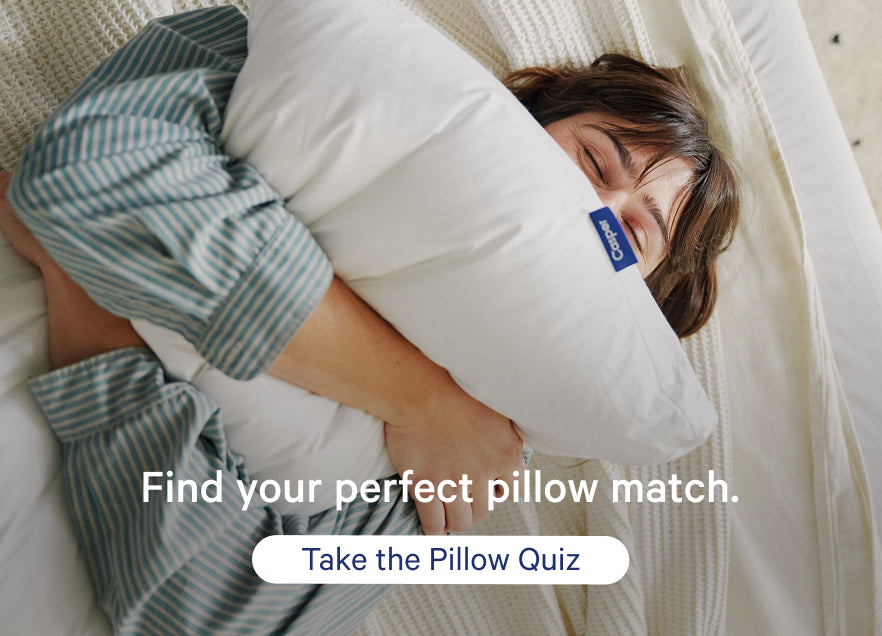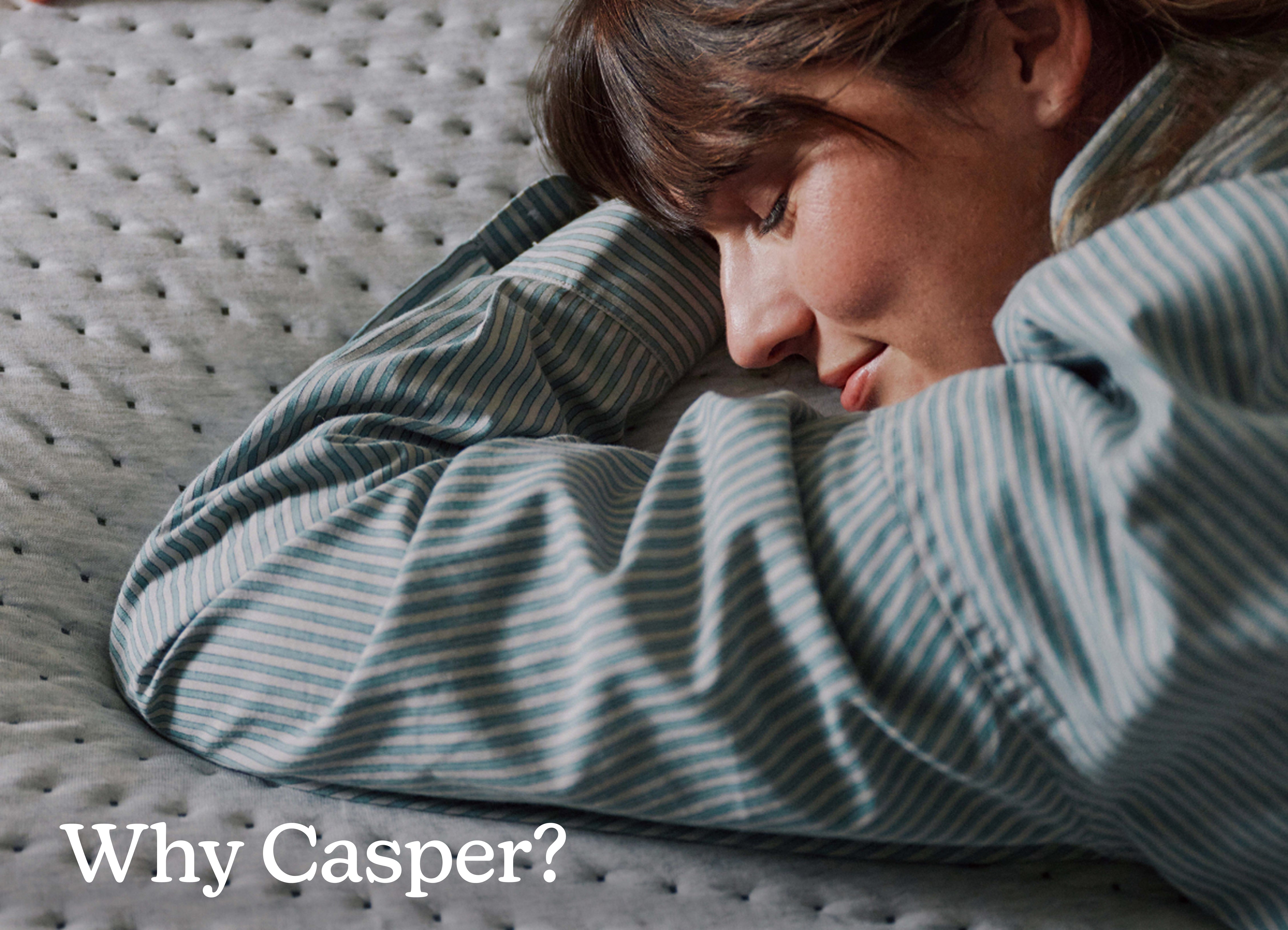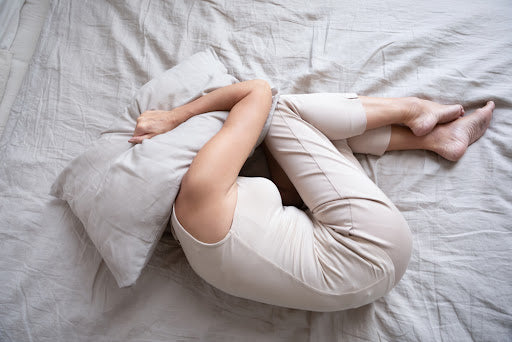Medical Disclaimer: The information provided in this blog article is for educational purposes only and does not substitute for medical advice.
Mornings matter. Whether you’re preparing for a big day at the office or setting off for Sunday brunch, you deserve to wake up feeling well-rested and ready to plow forward. Of course, this can be a tall order if you’re not getting proper sleep every night.
If you’re tired of being tired, read on to discover the common causes of poor sleep. From sleep disorders to mattress discomfort, we’ll explore potential reasons why you may be experiencing poor sleep quality and offer some practical solutions to improve your sleep hygiene for a more restful night.
Read on for the top poor sleep causes.
#1. Lifestyle

What’s your average day like? From the moment you wake up to the moment you’re carried off to dreamland, the choices you make can have a major impact on your sleep quality.
Your sleep disruptions may be related to the following habits and lifestyle choices:
- Evening workouts – Physical activity is a pillar of a healthy lifestyle. Unfortunately, late-night fitness routines can lead to an elevated heart rate when the time comes to turn in for the night. Consider moving your workout a few hours earlier for the sake of getting sufficient sleep.
- Electronic devices – It can feel hard to disconnect, but spending too much time on your devices could be causing you sleep deprivation. Recent studies have shown a correlation between the blue light of illuminated screens and sleep problems.1 Blue light can throw off your circadian rhythm, preventing you from getting adequate sleep. It might not always be easy, but avoiding screen time before or while in bed could lead to serious sleep improvements.
- Sleep schedule disorder – Are you always playing catch up on your sleep? You’re probably knee deep in sleep debt. Sleeping in some mornings or taking midday naps can help replenish your energy in the moment, but it can also contribute to a disordered sleep schedule. Adjust your sleep habits and adopt a more consistent schedule. It may just be your ticket to sweet dreams every night.
#2. Diet
From your mood to your immune system, what you eat affects just about every aspect of your life—and yes, that includes your sleep. If you’re wide awake at bedtime or reaching for the snooze alarm every morning, you might consider making some dietary changes.
What kind of changes? Check out the following suggestions:
- Avoid midnight snacks – If you’re the type to raid the fridge close to bedtime, it could be affecting your sleep quality. Late-night snacks can cause gastrointestinal discomfort and heartburn. Plus, you’re more likely to wake up in the middle of the night to use the bathroom.
- Eat a full and balanced diet – Recent research suggests a correlation between vitamin deficiencies and sleep problems.2 Additionally, meals high in carbohydrates may harm your rest, and sugary foods, in particular, can cause delayed sleep and lower-quality sleep when you finally do drift off.3
- Be mindful of alcohol and caffeine intake – While many Americans rely on a cup of coffee to brighten their mornings, consuming caffeine in the evening can make falling asleep extremely difficult. Alcohol, on the other hand, may make you sleepy, but after an evening of drinking, your quality of sleep will likely suffer.
#3. Mattress Quality
It should come as no surprise that what you sleep on has a lot to do with how you sleep. This means your mattress matters—big time.
If you’ve been struggling with getting adequate sleep, it might be time to evaluate your mattress. Factors to think about include:
- Firmness – Mattress firmness and support preferences are highly personalized. Your sleeping position, weight, and health can all play a role when deciding on mattress firmness. That said, if your mattress feels like it’s sinking or caving in, or if you frequently wake up sore and achy, it may be time for a replacement. Consider a more supportive option, like the Casper Wave Hybrid. Gel pods and a unique foam shaping system allow this hybrid mattress to cradle your body while providing optimal spinal alignment to eliminate morning aches and pains.
- Temperature – Sweating throughout the night can make staying asleep nearly impossible. If you can’t seem to find a comfortable temperature, you may benefit from a cooling mattress protector, more breathable sheets, or a mattress designed with heat-resistant materials, like the Casper Nova Hybrid Mattress with Snow Technology. This cooling mattress features 2 layers of perforated foam that work to move heat away from your mattress, rather than trapping it beneath you.
A bad mattress that doesn’t properly support you or provide you with comfort can significantly impact your sleep quality. If you do find that this is the issue, use a mattress buying guide to find yourself a new high-quality mattress.
Whether you sleep hot or cold, desire a soft or firm mattress, or need extra support for your back, Casper has a mattress that is designed to better your sleep quality at night.
#4. Stress

Mental health affects us daily. For most of us, stress is a given. Work, life, responsibilities—the day-to-day isn’t always a walk in the park (or a snooze in the dark). If you’re feeling the pressure during your waking hours, there’s a high chance it’s negatively impacting your sleep.
The following facts might surprise you when it comes to the link between stress and sleep:
- Fight or flight – Stress can activate your fight or flight response, also known as your automatic nervous system. This bodily function causes the release of stress-related hormones like cortisol and adrenaline, increasing your heart rate and blood flow—not exactly a benefit when you’re trying to sleep.4
- It’s a cycle – A stressful day leads to a fitful sleep. A fitful sleep leads to a groggy morning. A groggy morning compounds your stress and increases the chance of another rough sleep. The vicious circle of stress and sleep can be hard to break, but given a few days of rest and relaxation, your body can readjust, and you can break the cycle.
There are several simple ways to reduce daily stress, including:
- Exercise
- Meditation
- Avoiding nicotine
- Reducing your stress triggers
Don’t hesitate to talk to a health care professional if your stress feels unmanageable. Taking care of your mental health is crucial, and something you should not be afraid of discussing. Once you know your stressors, you can look forward to more restful nights and brighter mornings.
#5. Health Changes
Feeling out of whack due to a recent health change? A sleep problem is often the most obvious symptom.
If you’ve noticed a downturn in your sleep quality, take a moment to reflect on what might be different when it comes to your health, including:
- New medication – From blood-pressure pills to anti-depressants, adjusting to a new medication can cause several less-than-stellar evenings. Fortunately, it’s usually only a matter of time before your body readjusts. If you’re still dealing with sleep difficulties several weeks after starting a new medication, consult your health care provider. It may be time to consider other options.
- Aging – It’s not necessarily sudden, but aging can sneak up on you. As we age, sleep tends to get a little more complicated. Whether you’re waking up to visit the restroom more often or dealing with chronic illness, sleep problems can become more common as we age.5
You don’t have to accept insufficient sleep due to aging and health changes. With proper treatment, thoughtful lifestyle changes, and professional consultation, your golden years can be comfortable and restful.
#6. Sleep-Related Disorders
Whether you’re waking up too early, having trouble staying asleep, or spending hours unable to fall asleep in the first place, you may be suffering from insomnia. An estimated 70 million Americans suffer from insomnia every year, but that’s not the only sleep disorder that can cause considerable sleep trouble.6
Common medical issues causing sleep disruption can also include:
- Restless leg syndrome (RLS) – Also known as Willis-Ekbom disease, RLS results in leg discomfort and unintentional leg movement.7 If you find it difficult to lay still without kicking, thrashing, or moving around, you may be dealing with RLS.
- Sleep apnea – A common but serious sleep disorder, sleep apnea results in obstructive breath, causing gasping, snorting, or choking sounds.8 Because your breathing is interrupted, you’ll never be able to fall into a deep sleep and, if left untreated, obstructive sleep apnea can pose serious health risks.
#7. Environmental Problems
Most of us have a bedroom designed to facilitate sufficient sleep. It may include cozy blankets, calming decor, or relaxing scents. However, some environmental factors can turn even the coziest of bedrooms into a stressful sleep environment.
Common environmental sleep loss disturbances can include:
- Street noise – Honking cars, howling dogs, and bright street lights can spell disaster for your slumber. The cause of your insomnia may be just outside your window.
- Restless partner – If you’re sleeping next to someone with their own sleep troubles, there’s a good chance your sleep will be affected too. A snoring or restless partner can make falling and staying asleep a double struggle.
Some environmental factors may feel out of your control, but many products could assist with a better night’s sleep. Blackout curtains, sleep masks, earplugs, and white noise machines could all have a positive effect on your quality of sleep.
Achieving Quality Sleep With a Quality Mattress

Sleep health is important and there’s a lot that can get in the way of a good night’s sleep, but that doesn’t mean you have to accept a sub-par slumber. If you’re wondering the best way to fight back against insufficient sleep, the battle may start in your bedroom, especially if you’re dealing with a sub-par mattress.
At Casper, we can help you achieve quality sleep, night after night. Our mattresses offer everything from spine-aligning Zoned-Support to advanced cooling technologies to make every snooze count. Choose between all-foam or hybrid designs and achieve the sleep you’ve been dreaming of.
Sources:
- Harvard Health Publishing. Blue light has a dark side. https://www.health.harvard.edu/staying-healthy/blue-light-has-a-dark-side
- National Library of Medicine. Micronutrient Inadequacy in Short Sleep: Analysis of the NHANES 2005-2016. https://pubmed.ncbi.nlm.nih.gov/31581561/
- Sleep Foundation. Nutrition and Sleep. https://www.sleepfoundation.org/nutrition
- Medical News Today. How to tell if stress is affecting your sleep.https://www.medicalnewstoday.com/articles/322994#stress-and-sleep
- Medline Plus. Aging changes in sleep.https://medlineplus.gov/ency/article/004018.htm
- Cleaveland Clinic. Insomnia.https://my.clevelandclinic.org/health/diseases/12119-insomnia
- Mayo Clinic. Restless legs syndrome.https://www.mayoclinic.org/diseases-conditions/restless-legs-syndrome/symptoms-causes/syc-20377168
- Medline Plus. Sleep Apnea https://medlineplus.gov/sleepapnea.html













